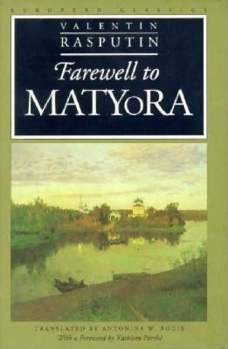Farewell to Matyora
Select Format
Select Condition 
Book Overview
A fine example of Village Prose from the post-Stalin era, Farewell to Matyora decries the loss of the Russian peasant culture to the impersonal, soulless march of progress. It is the final summer of the peasant village of Matyora. A dam will be completed in the fall, destroying the village. Although their departure is inevitable, the characters over when, and even whether, they should leave. A haunting story with a heartfelt theme, Farewell to Matyora...
Format:Paperback
Language:English
ISBN:0810113295
ISBN13:9780810113299
Release Date:September 1995
Publisher:Northwestern University Press
Length:227 Pages
Weight:0.67 lbs.
Dimensions:0.8" x 5.1" x 7.7"
Customer Reviews
2 ratings
from Portland with Love
Published by Thriftbooks.com User , 17 years ago
The outstanding novel of the Russian Village Prose school, Farewell to Matyora decries the loss of Russian peasant culture to the impersonal, soulless march of progress. Rasputin, an important rightist politician and environmentalist in the Soviet Union today, argues that mankind can only be spiritually regenerated by returning to the old, rural way of life. Translated by Antonina W. Bouis, with a foreword by Kathleen Parthe
Farewell to Matyora is Grand!
Published by Thriftbooks.com User , 21 years ago
Valentin Rasputin's "Farewell to Matyora" is an outstanding work of Russian literature that I highly recommend. Of course, such novels are better read in their native language, but for those of us who don't read Russian (I fortunately do!), this novel may be one of the only English-language translations available and, as such, is a great boon. Valentin Rasputin has been called one of the most important voices of the post-Stalin era of Soviet literature. Indeed, it has been compared to Solzhenitsyn's masterpieces "One Day in the Life of Ivan Denisovitch" and "Matyora's Home." One of Rasputin's shining graces is that he openly exposes the inward charms of Russian character and culture.The story itself is about the destruction of a village to make way for a Soviet hydroelectric dam project. The dynamics between the older and younger members of the village and their feelings about their imminent departure from a place that has been home to them their whole lives forms the central conflict and interest of the novel. At the same time, the author reveals some of the deep-seated values about the relationship between man and nature that are key to Russian culture. The blurbs on the back of the novel had a statement that I wanted to share:"A haunting story with a heartfelt theme, `Farwell to Matyora' is a passionate plea for humanity and an eloquent cry for a return to an organic life."My strongest criticism of the novel is that the translator in many places seemed to come up short with ways to adequately portray the nuance and charm that are some of Rasputin's strongest charms in his native Russian. In many places the English translation did a very poor job of conveying the Russian meaning. I compared the Russian original to the English translation several times throughout the novel. I feel that the translator simply wasn't up to the task although I certainly don't think I could do a better one. Translation is an art, and, at that, a fickle one. One of my favorite little phrases that the translator decided to keep was "Japanese Gods," which is a euphemism for cursing in Russian that a charming old codger of a character frequently repeats in his efforts to keep from actually cursing around another character that he considers is a "lady." Read "Farewell to Matyora" because it's a charming novel for a lover of Russian literature. I highly recommend it.Review by: Maximillian Ben Hanan





